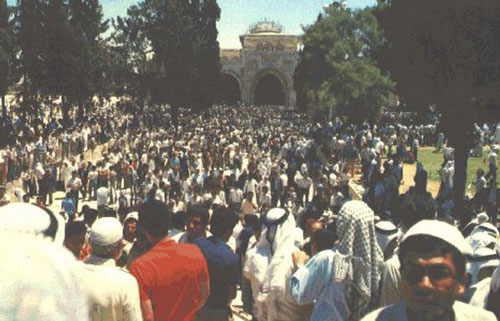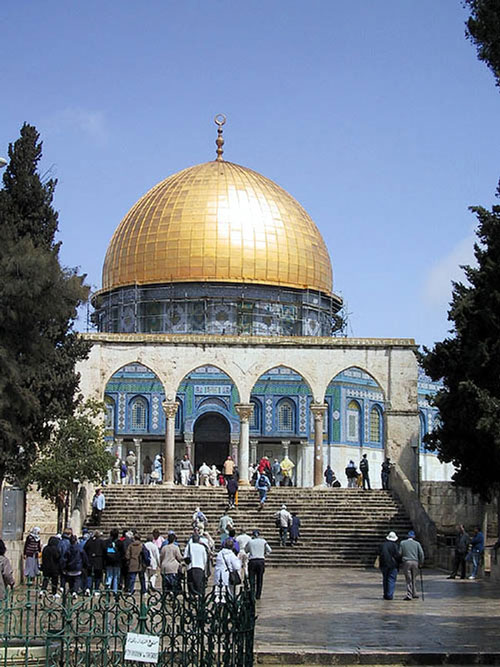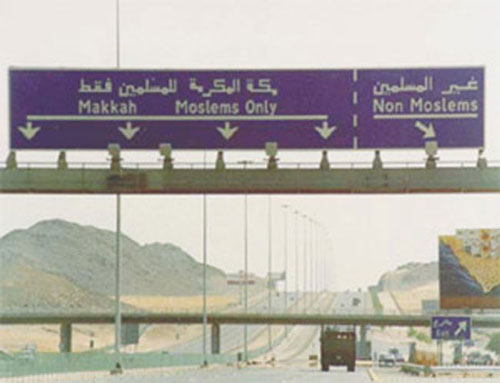Jerusalem/Israel
- The Freest Arab Press in the Middle East -
Open to All Religions - Mosques, Churches and Synagogues Full of
Believers
 The
Jerusalem Times is published by Palestinians in Jerusalem -
under Israeli rule. So do
Al-Quds, Palestine
Report, and others. Ironically, the only free Arab press in
the Middle East is published in Israel. Arab and Iran media have
their own reporters in Israel. The freedom of speech allows Arab
and Iranian journalists to criticize Israel and praise Arab police
states, tyrannies and theocracies. The
Jerusalem Times is published by Palestinians in Jerusalem -
under Israeli rule. So do
Al-Quds, Palestine
Report, and others. Ironically, the only free Arab press in
the Middle East is published in Israel. Arab and Iran media have
their own reporters in Israel. The freedom of speech allows Arab
and Iranian journalists to criticize Israel and praise Arab police
states, tyrannies and theocracies.
The
sole Arab parties in the Middle East participating in free elections
send members to the Israeli parliament (where they use the Western
freedom of speech to critisize Israel and praise Arab police states).
The only freely elected
Arab parliamentarians in the Middle East are members of the
Israeli
Parliament - in Jerusalem. The only court in the Middle East
from which an Arab or a Muslim can expect justice is the Israeli
Supreme Court - in Jerusalem - which is one of the most highly regarded
in the world. Israel is the only place in the Middle East where
an Arab or Muslim can freely criticize his government.
Moslems
at Al-Aksa Mosque in Jerusalem/Israel:

Christians
visiting Omar Mosque in Jerusalem/Israel:

 Churches
in Jerusalem/Israel (Israeli Yellow Pages) Churches
in Jerusalem/Israel (Israeli Yellow Pages)
 TREATMENT
OF CHRISTIANS AND JEWS (AND THE OTHER INFIDELS) IN SAUDI ARABIA,
SPIRITUAL CENTER OF ISLAM (World Travel Guide): TREATMENT
OF CHRISTIANS AND JEWS (AND THE OTHER INFIDELS) IN SAUDI ARABIA,
SPIRITUAL CENTER OF ISLAM (World Travel Guide):
Mecca: the spiritual centre of
the Islamic world, forbidden to non-Muslims.

Medina: the second-holiest city in Islam, forbidden to non-Muslims.
Saudi Arabia prohibits Christians from practicing their religion
and Jews from living in the country. Apostasy from Islam is punished
with public beheading.
 The
Muslim Claim to Jerusalem (Daniel Pipes): "The Jewish connection
to Jerusalem is an ancient and powerful one. Judaism made Jerusalem
a holy city over three thousand years ago and through all that time
Jews remained steadfast to it. Jews pray in its direction, mention
its name constantly in prayers, close the Passover service with
the wistful statement "Next year in Jerusalem," and recall
the city in the blessing at the end of each meal. The destruction
of the Temple looms very large in Jewish consciousness; remembrance
takes such forms as a special day of mourning, houses left partially
unfinished, a woman's makeup or jewelry left incomplete, and a glass
smashed during the wedding ceremony. In addition, Jerusalem has
had a prominent historical role, is the only capital of a Jewish
state, and is the only city with a Jewish majority during the whole
of the past century. In the words of its current mayor, Jerusalem
represents "the purist expression of all that Jews prayed for,
dreamed of, cried for, and died for in the two thousand years since
the destruction of the Second Temple." The
Muslim Claim to Jerusalem (Daniel Pipes): "The Jewish connection
to Jerusalem is an ancient and powerful one. Judaism made Jerusalem
a holy city over three thousand years ago and through all that time
Jews remained steadfast to it. Jews pray in its direction, mention
its name constantly in prayers, close the Passover service with
the wistful statement "Next year in Jerusalem," and recall
the city in the blessing at the end of each meal. The destruction
of the Temple looms very large in Jewish consciousness; remembrance
takes such forms as a special day of mourning, houses left partially
unfinished, a woman's makeup or jewelry left incomplete, and a glass
smashed during the wedding ceremony. In addition, Jerusalem has
had a prominent historical role, is the only capital of a Jewish
state, and is the only city with a Jewish majority during the whole
of the past century. In the words of its current mayor, Jerusalem
represents "the purist expression of all that Jews prayed for,
dreamed of, cried for, and died for in the two thousand years since
the destruction of the Second Temple."
What about Muslims?
Where does Jerusalem fit in Islam and Muslim history? It is not
the place to which they pray, is not once mentioned by name in prayers,
and it is connected to no mundane events in Muhammad's life. The
city never served as capital of a sovereign Muslim state, and it
never became a cultural or scholarly center. Little of political
import by Muslims was initiated there.
One comparison
makes this point most clearly: Jerusalem appears in the Jewish Bible
669 times and Zion (which usually means Jerusalem, sometimes the
Land of Israel) 154 times, or 823 times in all. The Christian Bible
mentions Jerusalem 154 times and Zion 7 times. In contrast, the
columnist Moshe Kohn notes, Jerusalem and Zion appear as frequently
in the Qur'an "as they do in the Hindu Bhagavad-Gita, the Taoist
Tao-Te Ching, the Buddhist Dhamapada and the Zoroastrian Zend Avesta"-which
is to say, not once."
|








